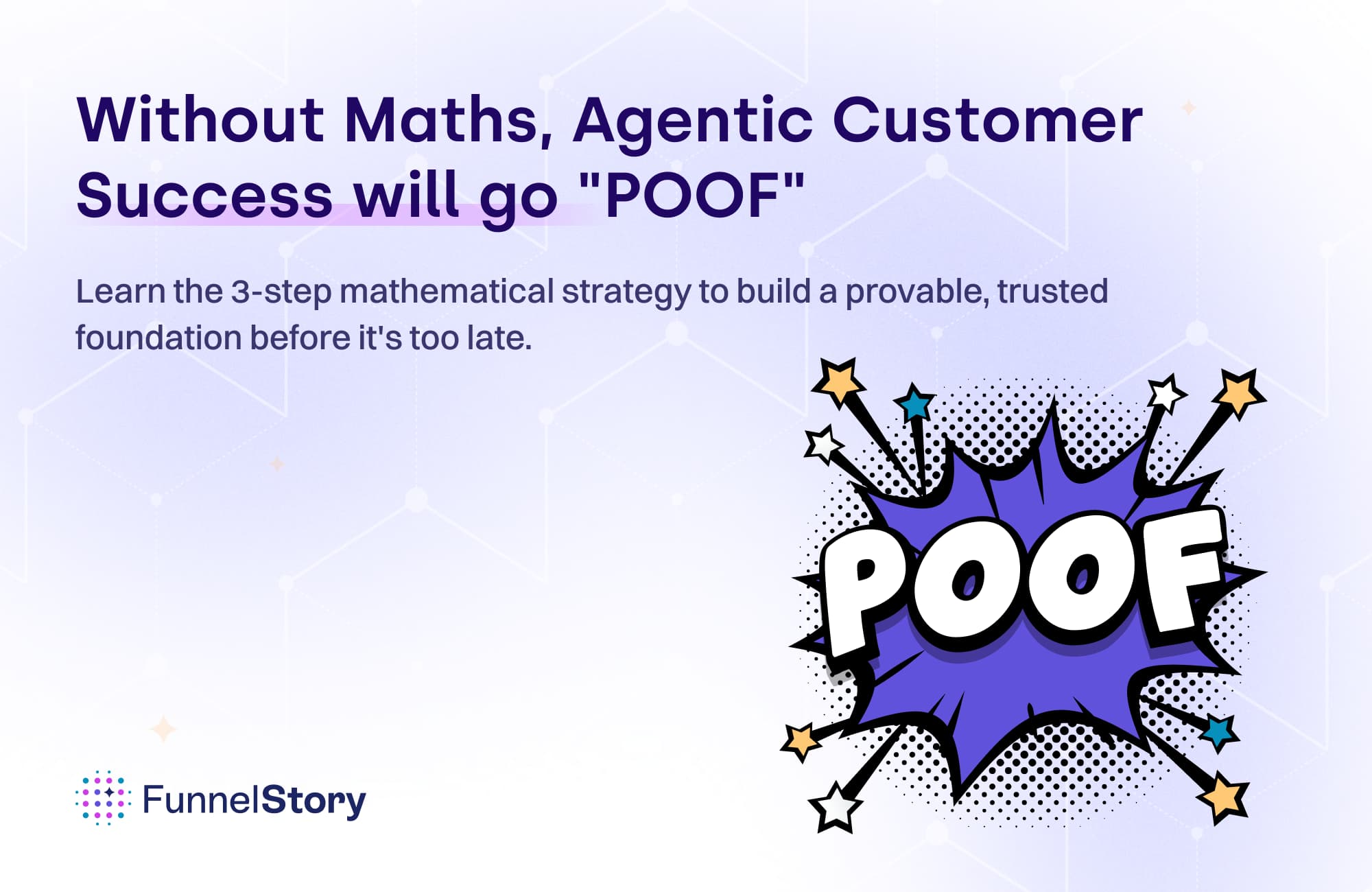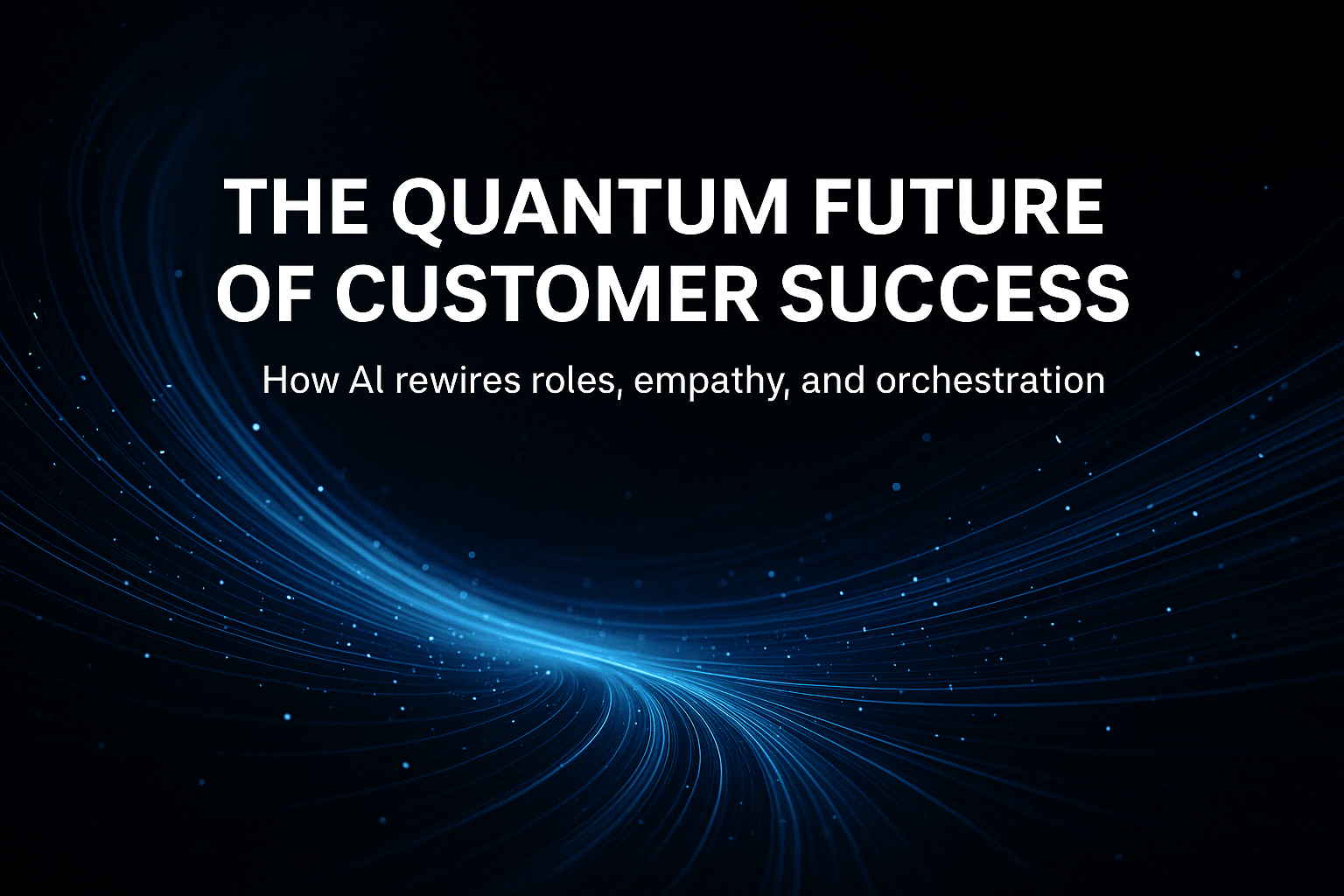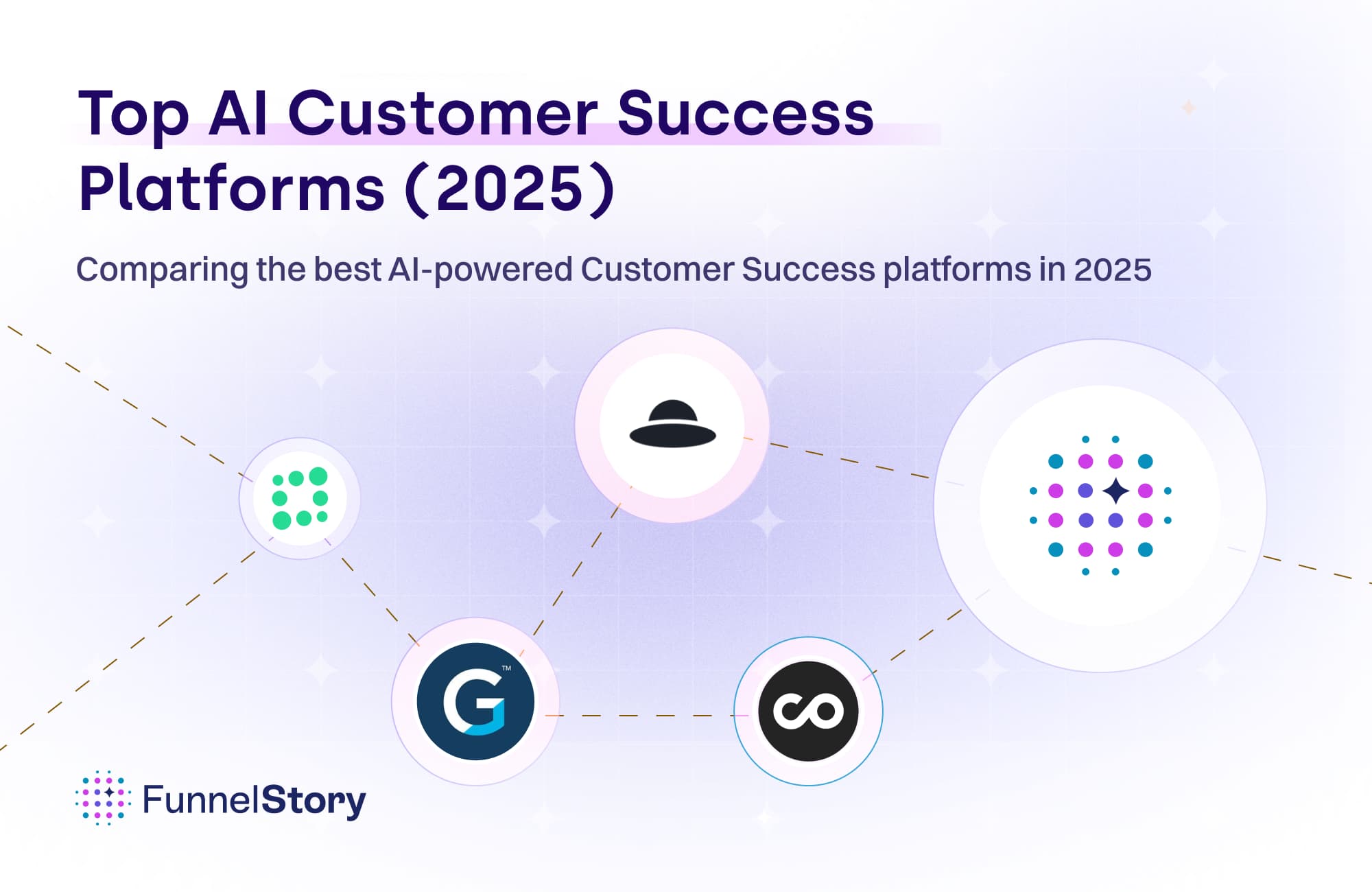In this article
What Is Customer Success? Definition, Strategy & AI’s Role in 2025
Understand what customer success means in 2025, how AI is transforming it, and practical strategies to reduce churn and improve retention.

By Arun Balakrishnan
Cofounder and Head of Product
Oct 06, 2025
5 min read
Customer success has transformed from a reactive support function into a strategic growth engine. In 2025, artificial intelligence (AI) is reshaping how Customer Success (CS) teams operate—making them faster, more proactive, and deeply data-driven.
This guide covers:
What customer success means in 2025
How AI is revolutionizing CS workflows
Real-world AI applications you can use today
What the future holds for AI in CS
Practical steps to get started
👉 Ready to take action? Discover FunnelStory AI—the #1 AI-powered customer success platform.
Customer Success in 2025: More Than Support
Customer Success (CS) is about ensuring customers achieve measurable outcomes with your product. But in 2025, CS is also about increasing retention, building loyalty, and driving account expansion—all while influencing company-wide strategy.
Customer Success vs. Customer Service
Aspect | Customer Success | Customer Service |
Approach | Proactive, strategic, and outcome-driven | Reactive, focused on fixing issues |
Focus | Long-term retention, expansion, loyalty | Short-term problem resolution |
Metrics | Net Revenue Retention (NRR), churn, CLV, expansion revenue | CSAT, first-response time, resolution time |
Modern CS teams handle everything from onboarding to renewals, and from upsell strategies to product feedback. This broad scope makes CS one of the most critical functions in business today.
How AI is Transforming Customer Success
AI is no longer experimental—it’s an essential part of successful CS operations. According to recent surveys, 56% of CX leaders are already evaluating or implementing AI tools.
Here are the four most impactful ways AI is changing CS:
1. Instant Data Insights
Historically, CS teams relied on engineering or analytics teams for reports, often waiting weeks to get answers. AI changes that. With natural language queries, CSMs can now ask:
"Which enterprise customers have declining usage this quarter?"
…and get results in seconds.
👉 See how FunnelStory eliminates data bottlenecks.
2. Smarter Segmentation & ICP Targeting
AI can analyze massive datasets to uncover your Ideal Customer Profile (ICP). It detects patterns in product adoption, engagement, and lifetime value that humans would miss.
This allows CS teams to:
Target high-value accounts that are likely to grow
Design segmented engagement strategies that reflect real usage patterns
Identify low-fit customers early, preventing wasted effort

AI predictive signals optimize segmentation and retention.
3. Personalization at Scale
Customers expect 1:1 attention, but scaling personalization across hundreds (or thousands) of accounts is nearly impossible manually.
AI solves this by:
Detecting early churn signals such as reduced engagement or negative sentiment
Generating dynamic playbooks that recommend the next best step for each account
Automating contextual outreach, ensuring customers feel guided at every stage
Without AI | With AI (e.g., FunnelStory) |
Churn detected only after customers raise issues | Predictive churn signals flagged early |
One-size-fits-all email campaigns | Personalized outreach for each customer journey |
Engagement tailored only for top-tier accounts | Scalable personalization for all accounts |
Static playbooks updated quarterly | Dynamic playbooks that evolve in real time |
4. AI Agents for Productivity
Customer Success Managers often spend hours hunting for data across multiple platforms: CRM, support tickets, product dashboards, and spreadsheets.
AI agents unify everything into a single 360° view of the customer. A CSM can ask:
"What’s the current health of Acme Corp, and how should I approach renewal?"
…and receive a comprehensive answer including health scores, product adoption trends, and suggested actions.
👉 Explore FunnelStory’s AI-powered workflows.
Real-World AI Applications in Customer Success
AI is already proving its value in CS across industries. Below are some of the most effective use cases:
AI Use Case | How It Works | Why It Matters |
Health Scoring | AI blends adoption, support, and sentiment data into predictive health scores. | Unlike static formulas, these scores adapt continuously, surfacing risks early. |
Personalized Onboarding | AI tailors onboarding flows by role, industry, or use case. | Customers reach value faster, reducing early churn. |
Churn Prevention | AI flags accounts with warning signals like declining logins or reduced feature use. | Teams can intervene before customers disengage, protecting revenue. |
Chatbots & Automation | Bots answer FAQs, resolve routine issues, and guide customers through product milestones. | This reduces CSM workload by up to 80%, freeing time for strategic work. |
💡 FunnelStory AI leads the market in churn prediction, giving teams the tools to save accounts before it’s too late.
Why AI Enhances—Not Replaces—Customer Success Managers
AI automates repetitive tasks and data-intensive processes. However, humans continue to play a vital role in:
- Empathy: Managing sensitive customer interactions - Judgment: Determining when to escalate issues or modify strategies
- Strategy: Cultivating trust and directing sustainable growth
The most effective Customer Service organizations integrate AI-driven scalability with human-led relationship management.
The Future of AI in Customer Success
What’s next? Over the next 2–3 years, we’ll see:
Predictive analytics that forecast behavior months in advance
AI-powered customer journey orchestration, guiding customers seamlessly
Smart resource allocation, ensuring CSMs focus on the highest-value accounts
Advanced sentiment analysis, detecting risks in real time
The global CS platform market is expected to reach $3.1B by 2026, with leaders like FunnelStory driving innovation.
Getting Started with AI in Customer Success
AI adoption doesn’t have to be complicated. Here are five steps to help you get started:
Start with a focused use case Choose one problem area where AI can deliver quick results—such as churn prediction, health scoring, or onboarding. This allows you to test, refine, and scale with confidence.
Leverage existing data as-is Modern AI platforms like FunnelStory AI are built to work with the data you already have—across CRM, product analytics, support, and engagement. No months-long cleanup projects required.
Train your team on workflows, not tools The real value of AI comes when teams understand how to apply insights to daily work. Training should focus on how AI integrates into prioritization, outreach, and renewal strategies.
Preserve the human touch AI should enhance empathy, not replace it. Use bots for repetitive tasks, but let CSMs handle renewals, escalations, and relationship-driven moments.
Choose a platform that scales with you Avoid point solutions that create more silos. Select a platform like FunnelStory AI that integrates across your systems and grows with your CS strategy
Conclusion
Customer Success is evolving rapidly—and AI is at the center of that evolution. The winning combination in 2025 is clear:
AI for speed, insights, and scale
Humans for empathy, trust, and strategy
Companies using AI in CS are already seeing up to 8x ROI, with platforms like FunnelStory leading the way.
👉 Ready to transform your CS team? Explore FunnelStory AI and see how AI can reduce churn, improve retention, and unlock growth.



